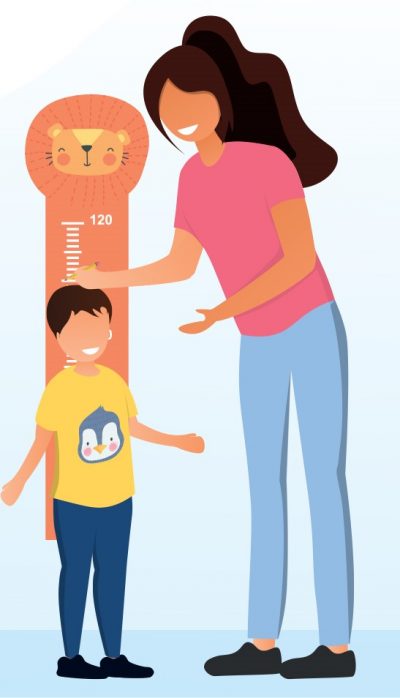Is your child growing optimally? Are you aware that the on-going COVID-19 pandemic and associated socioeconomic crisis could worsen the problem of child malnutrition?
Last year, a statement by the leaders of four UN agencies (UNICEF, FAO, WFP and WHO) warned that malnutrition among children is expected to rise due to COVID-19 and called for urgent actions to be taken by responsible parties and policy makers. Apart from the issues of overweight, obesity, wasting and micronutrient deficiency, stunting was also one of the major concerns mentioned.
Even before the pandemic, the National Health and Morbidity Survey reported the increasing prevalence of stunting among children under 5 years old from 17.7% in 2015 to 21.8% in 2019. This means that 1 out of 5 young children in Malaysia are stunted and the number could rise further due to the pandemic!
What is stunting?
Stunting basically refers to children’s failure to reach their full growth potential in terms of height. It is a common sign of chronic undernutrition in children. According to WHO, children are defined as stunted if their height-for-age is more than two standard deviations below the Child Growth Standards median.
Stunting happens due to a complex interaction of multiple risk factors. The current pandemic may further complicate matters. Here are some of the driving factors:
- Poor maternal nutrition and health
- Inadequate breastfeeding
- Poor complementary feeding
- Lack of access to quality foods
- Recurrent infections
- Household poverty
- Poor hygiene (food, water, household)
- Lack of care
- Lack of access to health services
- Lack of parental awareness
Stunting consequences
Stunting is largely irreversible as the child grows older, with less potential for recovery in later years. A child’s height cannot be recovered in the same way weight can be regained. Furthermore, a lack of proper nutrition also affects growth, brain and health development.
Short term
- Increased risk of mortality and morbidity
- Recurrent infections
- Developmental delays
Long term
- Irreversible effect on growth & brain development
- Increased risk of metabolic diseases as an adult
- Lower cognitive functions & learning capabilities
- Poor academic performance
- Reduced economic productivity
- Increased healthcare costs
- Cycle of malnutrition and stunting in offspring
Optimising growth
Height is a heritable trait, but parental height is not the main determinant of a child’s height. Studies show that all children have similar average growth during their early years with optimal growth conditions, which are:
The first 1000 days (from conception until 2 years of age)
- The best window of opportunity
- Exclusive breastfeeding the first 6 months
- Good complementary feeding practices
Good nutrition
- Child: A diverse and balanced diet, appropriate daily meal frequency
- Mother: During pregnancy and lactation for child’s early growth stages
Adequate physical activity
- Stimulates growth hormone production
- Releases serotonin, improving appetite and sleep quality
Good sleep quality
- With appropriate timing and duration
Track your child’s growth
By measuring, recording and tracking your child’s height and weight, plus monitoring their nutritional intake, parents will be able to detect and rectify any problem at the earliest stage before it worsens. You can use the following methods, with digital apps that are available online, or by consulting your doctor:
- Regular measurement (with height chart & weighing scale)
- Digital growth tracker
- Food diary
- Screening questions/checklists (e.g. Paediatric Nutrition Screening Tool or PNST)
Disruptions to health and nutrition services as well as the economic crisis during the pandemic are likely to exacerbate the problem of malnutrition if no steps are taken to address these issues immediately. Ensuring good nutrition for children and mothers is of utmost importance. Any concerns should be referred to an expert. Dietary advice and nutritional supplements may be necessary to catch up on any lag in growth.
An educational contribution by Malaysian Paediatric Association.








Comments